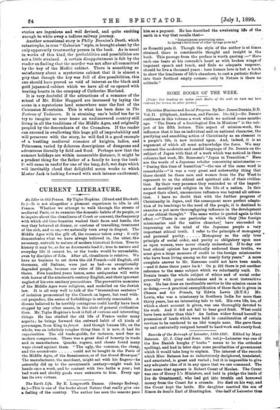CURRENT LITERATURE.
An Idler in Old France. By Tighe Hopkins. (Hurst and Blackett. Cs )—It is not altogether a pleasant experience to idle in old France. Whether we attempt to walk through the streets of medireval Paris, or to examine the domestic habits of its people, or to inquire about the cleanliness of Court or convent, the frequency with which old time beauties washed their faces and hands, the way they behaved at dinner, or customs of travelling, treatment of the sick, and so on,—we naturally turn away in disgust. The Middle Ages with the gilt off, the romance taken away : it only demonstrates what we have always believed in, the utter, the necessary, untruth to nature of modern historical fiction. True to history it may be, as far as documents lead it; true to nature and everyday life it cannot be, or the books would be unreadable, even by disciples of Zola. After all, cleanliness is relative. We have no business to set down the old French—old English, old Germans, old Italians, were just as bad—as exceptionally degraded people, because our rules of life are an advance on theirs. Five hundred years hence, some antiquarian will write with horror of the nineteenth-century English, and their ignorant neglect of his own sanitary precautions. The preventive measures of the Middle Ages were religious, and modelled on the Jewish law. It is all very well to talk of the "tremendous sentence" of isolation pronounced by the Church on lepers, but read with- out prejudice, the series of forbiddings is entirely reasonable. A disease believed to be terribly contagious could hardly have been stopped by any other means, in the state of general civilisation then. Mr. Tighe Hopkins's book is full of curious and interesting things. He has studied the old life of France under many aspects ; he brings forward the outward habit of all kinds of personages, from King to foreat. And though human life, on the whole, was an infinitely rougher thing than it is now, it had its superiorities. The old trade-guilds, for instance, need fear no modern comparison. There was a great deal of honesty in trade and in manufacture. Quacks, rogues, and cheats found many ways closed against them. "The ugly, the common, the cheap, and the second-rate could not be bought in the Paris of the Middle Ages, of the Renaissance, or of tue Grand Monargue." The manufacturer, the merchant, might eat with his fingers—he generally did up to the seventeenth century—might wash his hands once a week, and be content with two baths a year ; but bad work and shoddy goods were unknown to him. Every age has its own virtues.















































 Previous page
Previous page